英语委婉语论文
英汉委婉语论文:在英汉语言中委婉语的运用
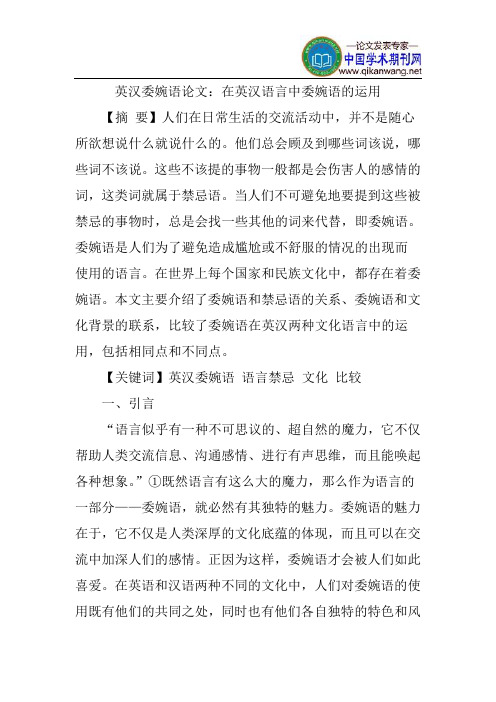
英汉委婉语论文:在英汉语言中委婉语的运用【摘要】人们在日常生活的交流活动中,并不是随心所欲想说什么就说什么的。
他们总会顾及到哪些词该说,哪些词不该说。
这些不该提的事物一般都是会伤害人的感情的词,这类词就属于禁忌语。
当人们不可避免地要提到这些被禁忌的事物时,总是会找一些其他的词来代替,即委婉语。
委婉语是人们为了避免造成尴尬或不舒服的情况的出现而使用的语言。
在世界上每个国家和民族文化中,都存在着委婉语。
本文主要介绍了委婉语和禁忌语的关系、委婉语和文化背景的联系,比较了委婉语在英汉两种文化语言中的运用,包括相同点和不同点。
【关键词】英汉委婉语语言禁忌文化比较一、引言“语言似乎有一种不可思议的、超自然的魔力,它不仅帮助人类交流信息、沟通感情、进行有声思维,而且能唤起各种想象。
”①既然语言有这么大的魔力,那么作为语言的一部分——委婉语,就必然有其独特的魅力。
委婉语的魅力在于,它不仅是人类深厚的文化底蕴的体现,而且可以在交流中加深人们的感情。
正因为这样,委婉语才会被人们如此喜爱。
在英语和汉语两种不同的文化中,人们对委婉语的使用既有他们的共同之处,同时也有他们各自独特的特色和风格。
二、委婉语的产生(一)英语委婉语的定义euphemism(委婉语)一词源于希腊语,字面意思就是“use of pleasant, mild or indirect words or phrases in place of more accurate or direct ones(用好听的、温和的或间接的词或短语代替那些精确或直白的表达方式)。
”②the random house college dictionary (1979)把euphemism(委婉语)定义为“the substitution of a mild, indirect, or vague expression for one thought to be offensive, harsh or blunt.”其意就是“用一种令人愉快的,委婉有礼的,听起来顺耳的词语来取代令人不快的、粗鲁无理的、听起来刺耳的词语”。
英语论文-英汉“死亡”委婉语文化对比分析

英汉“死亡”委婉语文化对比分析摘要:委婉语是人类社会中存在的一种语言现象。
由于东西方文化的不同,在委婉语的使用上也存在许多差异。
本文对中西委婉语跨文化现象进行了对比研究,揭示了其内在联系。
关键词:委婉语;传统委婉语;文体委婉语;宗教文化委婉语(Euphemism)一词源自希腊语的前缀eu=well 和词根pheme=speaking。
根据《英语委婉语详解词典》的定义,委婉语是一种用无害的或悦耳的词语替代那些较直接的、唐突的言词,用善意的话语把事实掩盖起来的修饰手段。
它不仅是一种社会语言现象,更是一种文化现象。
一、委婉语的分类和功能英语委婉语一般可分为两大类:传统委婉语(traditional euphemisms)和文体委婉语(stylistic euphemisms)。
所谓传统委婉语,是与禁忌语密切相关的。
如生、死、病、性等禁忌事物,如果直接表达,就是禁忌语,给人的感觉是粗鄙、生硬、无礼;反之如果间接表达,就是委婉语,给人的印象是典雅、含蓄、中听、有礼。
所谓文体委婉语,实际上是恭维语,溢美之词与禁忌语无关。
委婉语的功能有:避讳功能、避俗功能或雅化功能、礼貌功能、掩饰功能和褒扬功能(淡化或夸张功能)。
死亡是人类普遍面临的重大问题之一,在日常生活中时有发生。
由于英汉两种文化背景不同,所反映出的对死亡的看法存在很大差异。
二、英汉两种语言死亡委婉语不同的原因1、不同的宗教文化带来的表达差异基督教在英语国家的人们生活中发挥着重要作用,其关于死亡的委婉语多半来自《圣经》,与基督教信仰密切相关。
许多基督徒都相信“来世”和“原罪”之说,在他们看来,死亡就意味着"to go to heaven"(进天堂)、"to be called to Cod"(被召唤到上帝那) or "to cancel ones account"(销账)。
在中国,没有一种宗教能像基督教在英语国家所具有的重要地位和影响。
浅析英语委婉语
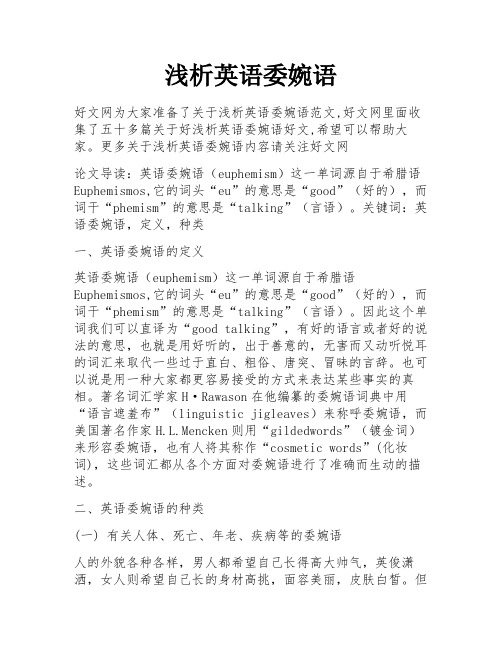
浅析英语委婉语好文网为大家准备了关于浅析英语委婉语范文,好文网里面收集了五十多篇关于好浅析英语委婉语好文,希望可以帮助大家。
更多关于浅析英语委婉语内容请关注好文网论文导读:英语委婉语(euphemism)这一单词源自于希腊语Euphemismos,它的词头“eu”的意思是“good”(好的),而词干“phemism”的意思是“talking”(言语)。
关键词:英语委婉语,定义,种类一、英语委婉语的定义英语委婉语(euphemism)这一单词源自于希腊语Euphemismos,它的词头“eu”的意思是“good”(好的),而词干“phemism”的意思是“talking”(言语)。
因此这个单词我们可以直译为“good talking”,有好的语言或者好的说法的意思,也就是用好听的,出于善意的,无害而又动听悦耳的词汇来取代一些过于直白、粗俗、唐突、冒昧的言辞。
也可以说是用一种大家都更容易接受的方式来表达某些事实的真相。
著名词汇学家H·Rawason在他编纂的委婉语词典中用“语言遮羞布”(linguistic jigleaves)来称呼委婉语,而美国著名作家H.L.Mencken则用“gildedwords”(镀金词)来形容委婉语,也有人将其称作“cosmetic words”(化妆词),这些词汇都从各个方面对委婉语进行了准确而生动的描述。
二、英语委婉语的种类(一) 有关人体、死亡、年老、疾病等的委婉语人的外貌各种各样,男人都希望自己长得高大帅气,英俊潇洒,女人则希望自己长的身材高挑,面容美丽,皮肤白皙。
但事实上这只是人们的主观愿望,而现实与愿望之间总会有各种各样的差距,当这些差距很大并且难以让人接受时,人们就需要用一种委婉的方式来表达。
比如说有人外表长得很丑陋时,如果直接用ugly这个词,那无疑会给别人自尊心以很大伤害,同时也显得自己素质不高,此时我们可以用plain(普通的)ordinary(一般的)以及homely等来表达。
英语委婉语的应用论文
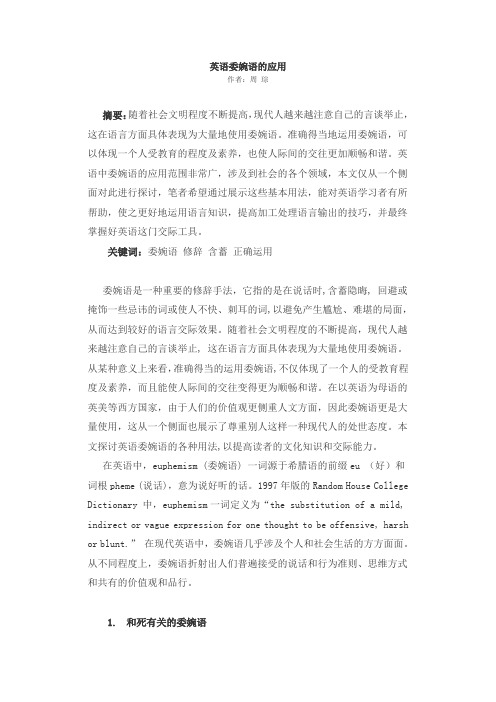
英语委婉语的应用作者:周琮摘要:随着社会文明程度不断提高,现代人越来越注意自己的言谈举止,这在语言方面具体表现为大量地使用委婉语。
准确得当地运用委婉语,可以体现一个人受教育的程度及素养,也使人际间的交往更加顺畅和谐。
英语中委婉语的应用范围非常广,涉及到社会的各个领域,本文仅从一个侧面对此进行探讨,笔者希望通过展示这些基本用法,能对英语学习者有所帮助,使之更好地运用语言知识,提高加工处理语言输出的技巧,并最终掌握好英语这门交际工具。
关键词:委婉语修辞含蓄正确运用委婉语是一种重要的修辞手法,它指的是在说话时,含蓄隐晦, 回避或掩饰一些忌讳的词或使人不快、刺耳的词,以避免产生尴尬、难堪的局面,从而达到较好的语言交际效果。
随着社会文明程度的不断提高,现代人越来越注意自己的言谈举止, 这在语言方面具体表现为大量地使用委婉语。
从某种意义上来看,准确得当的运用委婉语,不仅体现了一个人的受教育程度及素养,而且能使人际间的交往变得更为顺畅和谐。
在以英语为母语的英美等西方国家,由于人们的价值观更侧重人文方面,因此委婉语更是大量使用,这从一个侧面也展示了尊重别人这样一种现代人的处世态度。
本文探讨英语委婉语的各种用法,以提高读者的文化知识和交际能力。
在英语中,euphemism (委婉语) 一词源于希腊语的前缀eu (好)和词根pheme (说话),意为说好听的话。
1997年版的Random House College Dictionary 中,euphemism一词定义为“the substitution of a mild, indirect or vague expression for one thought to be offensive, harsh or blunt.”在现代英语中,委婉语几乎涉及个人和社会生活的方方面面。
从不同程度上,委婉语折射出人们普遍接受的说话和行为准则、思维方式和共有的价值观和品行。
[英语论文]浅谈英语委婉语的特点及应用
![[英语论文]浅谈英语委婉语的特点及应用](https://img.taocdn.com/s3/m/47739107cd7931b765ce0508763231126edb7771.png)
浅谈英语委婉语的特点及应用中文摘要在任何一个社会中,总有些不能直截了当说出来的话。
在人们交际的过程中,有些词语使人尴尬,惹人不快,招人讨厌或令人害怕,如果直接表达出来会给人一种粗俗、轻浮、无礼的印象。
因此在一些场合为了避免难堪,或减轻对人的感情伤害,人们创造了委婉语。
在西方社会文化生活中,在很多领域,人们广泛地使用着委婉语,这和世界上多数地区是一样的。
本文介绍了委婉语同禁忌语的关系,委婉语对语境的依赖性,着重介绍了英语委婉语的特点及在各个领域的应用,并探讨了人们使用这些委婉语的原因。
关键词:英语委婉语;禁忌语;语境;特点;应用AbstractIn every society there are certain things that are supposed to be unspeakable. A fair number of words make someone embarrassed、unhappy、dislike or fear when used in communication. If we express the meaning in the direct way, we will make such impression which is vulgar, frivolous, and impolite. In order to avoid the embarrassment or ease the sting of harsh words, man has created euphemisms. In western cultures, many of the fields that people tend to euphemize widely are not different from anywhere in the world. This paper introduces the relationship between euphemism and taboo and the dependence on the context. It mainly focuses on the characteristics and the application of English euphemism, and the causes of using euphemism.Key words: English euphemism; taboo; context; characteristics; applicationI一.引言委婉语是人类社会中普遍存在的一种语言现象,是用语言来调剂人际关系的一个重要手段。
英语委婉语广泛运用论文
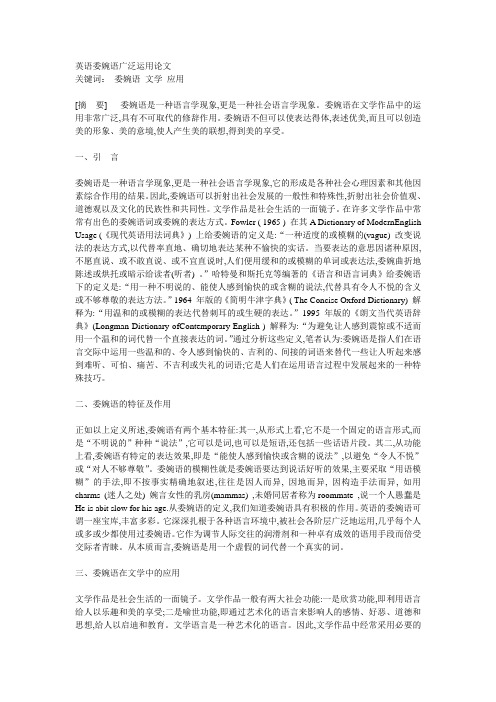
英语委婉语广泛运用论文关键词:委婉语文学应用[摘要] 委婉语是一种语言学现象,更是一种社会语言学现象。
委婉语在文学作品中的运用非常广泛,具有不可取代的修辞作用。
委婉语不但可以使表达得体,表述优美,而且可以创造美的形象、美的意境,使人产生美的联想,得到美的享受。
一、引言委婉语是一种语言学现象,更是一种社会语言学现象,它的形成是各种社会心理因素和其他因素综合作用的结果。
因此,委婉语可以折射出社会发展的一般性和特殊性,折射出社会价值观、道德观以及文化的民族性和共同性。
文学作品是社会生活的一面镜子。
在许多文学作品中常常有出色的委婉语词或委婉的表达方式。
Fowler ( 1965 ) 在其A Dictionary of ModernEnglish Usage (《现代英语用法词典》) 上给委婉语的定义是:“一种适度的或模糊的(vague) 改变说法的表达方式,以代替率直地、确切地表达某种不愉快的实话。
当要表达的意思因诸种原因,不愿直说、或不敢直说、或不宜直说时,人们便用缓和的或模糊的单词或表达法,委婉曲折地陈述或烘托或暗示给读者(听者) 。
”哈特曼和斯托克等编著的《语言和语言词典》给委婉语下的定义是:“用一种不明说的、能使人感到愉快的或含糊的说法,代替具有令人不悦的含义或不够尊敬的表达方法。
”1964 年版的《简明牛津字典》( The Concise Oxford Dictionary) 解释为:“用温和的或模糊的表达代替刺耳的或生硬的表达。
”1995 年版的《朗文当代英语辞典》(Longman Dictionary ofContemporary English ) 解释为:“为避免让人感到震惊或不适而用一个温和的词代替一个直接表达的词。
”通过分析这些定义,笔者认为:委婉语是指人们在语言交际中运用一些温和的、令人感到愉快的、吉利的、间接的词语来替代一些让人听起来感到难听、可怕、痛苦、不吉利或失礼的词语;它是人们在运用语言过程中发展起来的一种特殊技巧。
英语委婉语语用功能论文

浅议英语委婉语的语用功能摘要:委婉语在英语语言中是不可或缺的重要组成部分,是常见的修辞手段之一,在日常生活中广泛使用。
本文主要探讨了英语委婉语的几种语用功能。
关键词:英语委婉语语用功能一、委婉语的定义美国学者hugh rawson曾说,委婉语如此深深潜入我们语言,以至我们中间没有谁———即使那些自诩为直截了当的人———能够在不使用委婉语的情况下过完一天。
委婉语是一种用无害的或悦耳的词语替代那些较直接的、唐突的言词,用善意的话语把事实掩盖起来的修饰手段。
英文“euphemism”(委婉语)一词源自古希腊语,前缀eu(=good,sounding well,好的,好听的)和词根pheme(=speech or saying,话语或讲话)以及后辍ism(表明euphemism一词的名词性质)。
简单地说,“euphemism”的意思就是“fair speech(说好话)”,“use of good words(用吉言)”。
委婉语是人们交际的需要,是语言交际中协调人们社会关系以及人际关系的重要手段。
它不仅是一种社会语言现象,更是一种文化现象。
二、英语委婉语的语用功能使用委婉语可以使人能够较为容易的接受那些会让人感到不快或者尴尬的事实和信息。
委婉语可以帮助人们温柔得体地表达自己的意愿。
人们使用委婉语来表示尊重,迎合心理需要,显示不便直说的事实。
在交际过程中,归纳起来委婉语主要具有以下4种语用功能:(一)避讳功能由于对客观世界的某些事物及现象怀有恐惧心理,人们往往不想将描述这些事物和现象的用语直接表达出来,转而常用委婉语汇婉转地表述这类词语的意义。
最常见的例子就是“死亡”的表述方法。
在多数文化中,人们总是避免直接谈论死亡。
英语文化中人们同样避讳直接提及“die”和“death”。
这使得表述死亡话题的委婉语汇大量出现。
如“to pass away” , “to depart”, “to leave us”, “final sleep”等,都是死亡的委婉表达。
英语委婉语论文
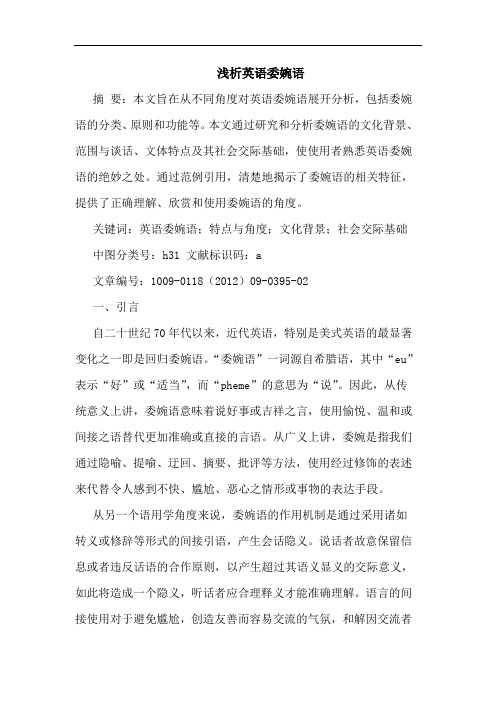
浅析英语委婉语摘要:本文旨在从不同角度对英语委婉语展开分析,包括委婉语的分类、原则和功能等。
本文通过研究和分析委婉语的文化背景、范围与谈话、文体特点及其社会交际基础,使使用者熟悉英语委婉语的绝妙之处。
通过范例引用,清楚地揭示了委婉语的相关特征,提供了正确理解、欣赏和使用委婉语的角度。
关键词:英语委婉语;特点与角度;文化背景;社会交际基础中图分类号:h31 文献标识码:a文章编号:1009-0118(2012)09-0395-02一、引言自二十世纪70年代以来,近代英语,特别是美式英语的最显著变化之一即是回归委婉语。
“委婉语”一词源自希腊语,其中“eu”表示“好”或“适当”,而“pheme”的意思为“说”。
因此,从传统意义上讲,委婉语意味着说好事或吉祥之言,使用愉悦、温和或间接之语替代更加准确或直接的言语。
从广义上讲,委婉是指我们通过隐喻、提喻、迂回、摘要、批评等方法,使用经过修饰的表述来代替令人感到不快、尴尬、恶心之情形或事物的表达手段。
从另一个语用学角度来说,委婉语的作用机制是通过采用诸如转义或修辞等形式的间接引语,产生会话隐义。
说话者故意保留信息或者违反话语的合作原则,以产生超过其语义显义的交际意义,如此将造成一个隐义,听话者应合理释义才能准确理解。
语言的间接使用对于避免尴尬,创造友善而容易交流的气氛,和解因交流者直接吐露观点而引发的冲突和对抗,都有重要意义。
例如,我们通过将丧葬承办人称作殡葬司仪表示对他们的尊重。
当我们把某残疾人称作能力不同者或行动不便者时,即通过使用委婉称谓,不直接说出他们的身体或精神缺陷,从而避免伤害他们的尊严和自信心。
二、英语委婉语的重要性及来源委婉语言的使用遍及社会生活的各个方面和世界每个角落。
不管我们多么直接,每一个人都始终逃不开委婉语的使用。
近代英语随处可见委婉表达,使用频率非常高,范围非常广。
在居住区附近的街角,我们可以看到“卫生工程师”(垃圾收集者),收集和处理城市日常生活产生的垃圾;我们可能注意到某政府或军事总部宣布“前线调整”,该表达字面意义模糊,而实际意思是考虑到潜在的失败或溃退而从前线撤回军队。
论文:委婉语
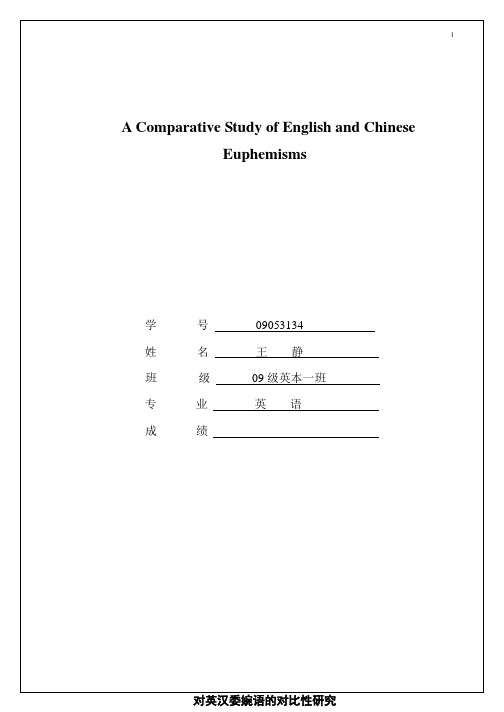
A Comparative Study of English and ChineseEuphemisms学号09053134姓名王静班级09级英本一班专业英语成绩对英汉委婉语的对比性研究摘要:委婉语是一种不用明说的、能够使人感到愉快或含糊的的说法代替具有令人感到不悦的含义或不够尊敬的表达方式。
委婉语这个词使用来自希腊,eu,意思是“好”或“听起来不错”。
pheme意味着说法。
字面意思是好的说法。
作为不可或缺的语言和自然的一部分,委婉语已引起了广泛兴趣。
因此,在其他研究者的基础上,本论文试图通过比较性研究委婉语与文化禁忌语的关系以及英汉委婉语的相似点和不同点,对英汉委婉语做一个全面的分析,旨在加深对委婉语的理解以及更好地在外语学习,跨文化交际以及我们的日常生活中使用它。
关键词:委婉语;相似性;差异;研究A Comparative Study of English and Chinese EuphemismsAbstract: Euphemism is mild, agreeable or, roundabout words use in place of coarse , painful or offensive ones. The term comes from Greek, eu meaning “well” or “sounding good ”. pheme means speech. Euphemism literally means good or pleasant speech. As an indispensable and natural part of language, euphemism has been arousing wide interest .Thus on the basis of others' researches, this thesis attempts to do a comprehensive analysis of English euphemism and Chinese euphemism by comparatively analyzing the relationship of euphemism with culture and taboos, and the similarities and differences of English and Chinese euphemism, aiming at deepening the understanding of the euphemism and to better use it in foreign language learning ,cross-cultural communication as well as in our everyday life .Keywords: euphemism; similarities; differences; analysisTable of contents1 .Introduction (1)2 A Brief Introduction to Euphemism (2)2.1A General Review of the Studies on Euphemism (2)2.2 Euphemism and Culture (3)2.3 Euphemism and Taboo (4)3 .Study on Euphemisms in English and Chinese (5)3.1 Comparison of Euphemisms in English and Chinese (5)3.2 Cultural Reasons for the Differences in Expressions (8)4 .Conclusion (9)Works Cited (11)1 .IntroductionEuphemism is the figure of speech which consists in the substitution of a word or expression of comparative favorable implication or less unpleasant associations instead of the harsher or more offensive one (Zhao 153). Politeness, as a symbol of human civilization, is a social、cultural as well as linguistic phenomenon that can be found in all languages and cultures. Euphemism is a strategy to achieve politeness in people’s daily conversation. Euphemisms, in a broad se nse, include all the ways of euphemistic expressions, such as words, phrases, sentences and discourses etc. In specific situation and context, even some nonverbal expressions can achieve the same effect as the verbal euphemisms.In the modern life, as a cultural phenomenon, euphemism is widely used more out of politeness than fear and the principles of politeness in west and east share something in common. Besides, English and Chinese euphemism is based on similar psychological factors: the psychology of pursuing beauty and self-defense. And dissimilarities or differences on cultural connotations in English and Chinese euphemisms exist, mainly focusing on the root of traditional culture and the value orientation. To be familiar with the linguistic features of euphemism in the target culture, to be aware of the differences between the target culture and the native culture and to interpret and use euphemism according to social context are keys to effective employment of euphemism in intercultural communication.2 .A Brief Introduction to Euphemism2.1A General Review of the Studies on EuphemismEuphemism is a common linguistic phenomenon in different cultures. Many scholars at home and abroad have made studies of euphemisms from different perspectives.British writer George Blunt advanced the term “euphemism” defining it as “a good or favorable interpretation of a bad word” .In 1983, American scholars J. S. Neaman&C.C. Silver published their book Kind Words, a Thesaurus of Euphemisms, which presents a detailed description on the history of euphemisms as well as deep discussions on that field. R.W. Holder’s A Dictionary of Euphemisms in 1995 illustrate euphemistic words and expressions with rich examples. Robert Burchfield’s view(2003), a language without euphemism would be a defective instrument of communication.The recorded study of Chinese euphemism dates back to Zhou Dynasty. As in the case of its English counterparts, ancient studies of Chinese euphemisms focus on the avoidance of certain names and of the folk customs at lexical level. A breakthrough is made by Chen Wangdao(1932) in his Introduction to Rhetoric. He extends the concept of euphemism to syntax or even discourse level. From the 1970s and the 1980s when foreign linguistic theories landed in China, Chinese linguists began to view euphemism from different perspectives: Chen Yuan(1932) makes a study from social linguistics, Wang Dechun(1995) makes a study from socialpsychological linguistics, Wu Liquan(2002) makes a study from culture and rhetorics, Shu Dingfang(1989) makes a study from pragmatics, Moreover, Zhang Gonggui (1996) compiled A Dictionary of Chinese Euphemisms.People in both languages have shared psychological foundations in the use of euphemisms. In Shu Dingfang’s view(1989), self-defense principle is fundamental in English and Chinese euphemisms. According to this principle, people tend to take their own social status and identity into consideration and try to protect self-benefits and honor. They use good words and expressions to talk about the things related to them instead of the vulgar ones. The achievements of predecessors left us abundant materials for reference and paved the way for us to study the subject more comprehensively.2.2 Euphemism and CultureEuphemism, as an indispensable part of every language, reflects customs, politics, life style and social psychology. For instance, we are sensitive about death, so “grave digger” was replaced by “undertaker”, later on “undertaker” was replaced with the Latinate “mortician”. And we are sensitive about bodily functions, so there are many euphemisms for “bathroom”. Learning Euphemism means learning to take the view as native speakers of that language, learning the ways their language reflects the ideas, customs, and behavior of their society.The relationship between euphemism and culture is too obvious now: Euphemism demonstrates its multiple mapping relations with culture; it varies withthe development of society, from one historical period to another. Understanding of the cultural Euphemisms enables us to catch the meaning conveyed.2.3 Euphemism and TabooA taboo is a strong social prohibition (or ban) relating to any area of human activity or social custom that is sacred and forbidden based on moral judgment and sometimes even religious beliefs. Breaking the taboo is usually considered objectionable or abhorrent by society. The primary examples of taboo words requiring the use of a euphemism are the unspeakable names for a deity, such as Persephone, Hecate, or Nemesis. In ancient Chinese, taboo is called quyu(曲语),referring to periphrasis or circumlocution, which means to speak the word indirectly, implying it without saying it. The appearance and the use of euphemisms are inevitably related to linguistic taboo.In ancient times, people had blind faith in ghosts and gods they respected. People whispered when they mentioned them. People even feared them so they did not dare to address their names directly. They believed it was profane to name gods. Therefore names of gods became the earliest taboos. To speak names of gods was to evoke the divinity whose power then had to be confronted. Societal taboos to a certain extent or to some people are the polarizing issues of sex, death, racism, genderism, ethnicity, nationality, religion, politics, money, socio-economic class, sexual orientation, disability and so on, which form the Euphemism.3 .Study on Euphemisms in English and Chinese3.1 Comparison of Euphemisms in English and ChineseEuphemism is a common linguistic phenomenon in different cultures. From the moment it is coined, it plays an important role in people's daily communication. It is not only a language phenomenon but also a culture one. To some extent, the euphemism generates from such circumstances of avoiding shame, of avoiding privacy and other psychological problems during interpersonal communication. Different cultures derive from different cultural backgrounds. Therefore, cultural differences would lead to the different uses of language.Taboo! Is the psychological basis of a euphemism. Some taboos in English and Chinese euphemism are same. For example: “death” is universally regarded as one of the taboos Death as the final outcome, whether ancient or modern, both the East and West, there are few differences. As a human being, regardless of whom he is and how he will be busy with his life, he must experience birth and death, young and old, finally, unveil them serious appearance to knock on the death door In Ch ina, People do not like the number”4”because they fear about the “die ”. Another group number is about“73 , 84”. Among old people , they think there are two key ages , if you are 73 or 84 years old , they believe that you will die before God of the hell invites you. So many old people are not willing to talk about their exact ages, if so they will shorten or prolong one year to overpass this two key ages.In western countries, people regard”13”as taboo. They never live No.13Room in the hotel, or not have the No 13 because of the religious belief. In most big hotels, there are not 13th story or No 13 Room. The Chinese said the death of euphemism: Deceased died! The death! Of old age!, Death! Sacrificed! The world long Speech! The heart stops beating! And see Marx! Furthermore, in ancient China, the uses of euphemisms of death are strictly classified according to different social ranks. Death of emperors is called“崩”, death of dukes”薨”, death of senior officials“卒”, death of Buddhist abbot “圆寂”, and death of the common “死”. English in the expression of death ,The euphemism of death! Depart from the world for ever, decease, breathe one last, pay one debt to nature, be with God, go the way of all flesh, etc. Recently, English euphemism of death more an more exaggerated, dead (The dead) became the deceased or the dear departed, dead! Is passed away, fallen asleep and gone to Jesus. This reflects that the people on death,in English, many euphemisms are used to fulfill this function. Some frequently used ones are “pass away” ,“depart” ,“pay one’s debt to nature” ,“go to better world”, “be with God”, etc. The same is true of Chinese euphemisms, which has“逝世”,“故去”,“寿终”,“作古”,“谢世”,“与世长辞”,“大限”,“去见马克思”and so on. Interestingly, English and Chinese culture also share a similar euphemism to express “death”. This one in English is “to go west”, in Chinese “西去”or“去西方了”( just means “go west”).The expression instead of the inconvenience straight. For example:(1) He is mentally ill (he had neuropathy.) Crazy! Do not insane or mad, if it is normal but can use: Are you mad (crazy)? (Are you crazy?)(2) Shi Tao: I secretly as people prepared. That thing (referring to Coffin) shall not be a good wood, and slowly do yet!I have had them secretly prepared. But I can not get any good wood for you know what, so I have let that go for the time being.!Good manners are produce euphemism the important psychological foundation. Taboo. is the unhappy things to avoid, polite, it is not the things of the withdrawal. The toilet of and the urine of euphemism and so on. For example, the toilet, in polite social, Chinese commonly used on the bathroom! Or a convenient, and euphemism says, English is commonly used in go to the men’ s (ladies’) room/rest Room/washroom/the John, or wash one s hands, relieve oneself, etc. Women pregnant! In Chinese euphemism has said the law's in trouble! Going to be a mom! And to upgrade! Etc; In English the wan committee view have big, with child, the begin Family way, expecting, etc. For example, the same word. ”wife ” has different calling toward different social classes. “天子之妻”called“后”,“诸侯之妻”called“夫人”, “大夫之妻”called“儒人”,“士之妻”called“妇人”, and“平民百姓”called really“妻”.In Chinese culture the word “old” is not an avoided one since there is a convention to respect and admire the old people. It has the connotation of “ enjoying high prestige and universal respect“. Therefore, in Chinese “老” is often used for addressing by adding. It at the end of the surname for expressing respect to the old people, such as “王老“,“李老” , etc.In western society, the issue of “old age ”is too sensitive to be mentioneddirectly. People try all means to avoid using the word “old” in daily life, instead they adopt many other pleasant words to replace this sensitive word. For example, they use “home for adult” for “old people’s home”, “an adult community” for “a community for old people”, and “senior citizen” for “old man”. He is not old but “longer living”, and he is not “a candle in the wind” but “in golden years”. He is also promoted to “elderly”, “mature” ,“an adult”, “a distinguished gentleman ”, “feeling one ’s age ”or “third age”. Reward the ability of some help. The psychological basis of its different tables , Now in the form, we from found in English language differences, and further analysis of the English literature, literary Kam Foundation. Differences in two different languages, English lead to English. The euphemism different performance form, which is reflected in the words and sentences type operation and with peers surface. Contrast to the Han English euphemism language. Wanyou Li, sound to not Ear-piercing. Theword Language-generation. For order people do not fast, Lu no Ceremony crude. It sounds harsh words. Avoid tabooand ritual appearance is produced Health euphemism language of the heart reason. In summary, the basic characteristics of the euphemism is delightfully.3.2 Cultural Reasons for the Differences in ExpressionsDifferent natural environments undoubtedly have a great impact on bringing forth different living habits of people and further bringing forth different cultures andcharacters. These differences help shape diversified expressions. Death euphemism is one of the representatives.Many scholars agree that eastern culture is a shame culture expecting the approval of others and the western culture is a guilt culture attaching great importance to self-identity.The thinking of people may be recorded in written materials or expressed in verbal language. What they say and what they write reveal how they think. Death euphemisms also reveal these differences. Their different thinking modes are reflected in their attitudes towards nature and social life. Their attitudes are also reflected in the language they use. Thus, varied death euphemisms come into being. Different aesthetic mental sets reflect people’s different understandings of the world. Different communicative values in English and Chinese cultures lead to different psychological inclinations;4 .ConclusionIn order to show the similarities and differences of cultural connotations, the present comparative study of English and Chinese euphemisms focuses on the analysis of the cultural roots with the examples mainly restricted to the lexical or phrasal level. Due to the limitation of resources, it just focus on typical expressions to illustrate the cultural connotations. And points out the similarities and differences between Chinese and western Euphemisms from the perspective of cultural. Althoughthe present study attempts to cover a wide range of the cultural points in the statement of comparison, it is still limited in terms of depth of research. All these limitations above may serve as the motivations for further study. Therefore in learning and using language, people should focus our attention on the acquisition of cultural knowledge for the sake of better communication. Learning how to use euphemisms on different occasions and understand the western and the Chinese culture, also has a profound and realistic effect on effective cross-cultural communication.Works CitedAllan, K.&K. Burridge. (1991). Euphemism and Dysphemism. Oxford: Oxford University press.Ayto, J. (1993). Euphemisms. London: Bloomsbury Publishing Limited.. Ayto, J. (1994). Times Euphemisms. Singapore: Federal Publications.. Kramsch, C. (2000). Language and Culture. Shanghai: Shanghai Foreign Language and Education Press.Neaman.Judith&Silver Carole. (1991). A Thesaurus of Euphemisms.World Publishing Corp, (1): 67.Rawson, Hugh. (1981). A Dictionary of Euphemisms and other Doubletalk. New York: Crown Publishers, Inc.Robert Burchfield. (2003). The English Language. Oxford: Oxford University Press.范家材. 英语修辞格赏析 [M ].上海: 上海交通大学出版社, 1992江希和. 现代英语中的委婉语 [J ]. 现代外语, 1983 (3): 14-19.刘纯豹. 英语委婉语词典 [M ]. 南京: 江苏教育出版社, 1996.李国南. 英汉修辞格对比研究[M ]. 福州: 福建人民出版社, 1999.潘绍嶂. 英汉修辞与写作[ M] . 上海: 上海交通大学出版社, 1998.束定芳. 现代汉语中的委婉语[J ]. 汉语学习, 1989 C2: 4-38徐海铭. 委婉语的语用学研究[M ]. 外语研究,1996 (3): 21-240.。
委婉语英语论文精品
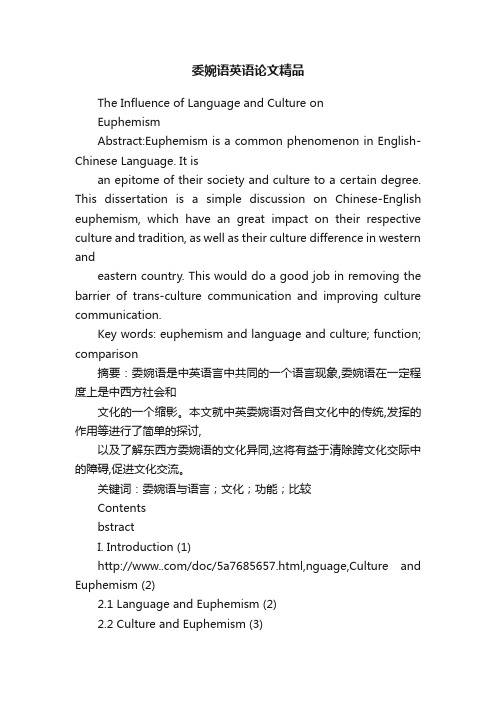
委婉语英语论文精品The Influence of Language and Culture onEuphemismAbstract:Euphemism is a common phenomenon in English-Chinese Language. It isan epitome of their society and culture to a certain degree. This dissertation is a simple discussion on Chinese-English euphemism, which have an great impact on their respective culture and tradition, as well as their culture difference in western andeastern country. This would do a good job in removing the barrier of trans-culture communication and improving culture communication.Key words: euphemism and language and culture; function; comparison摘要:委婉语是中英语言中共同的一个语言现象,委婉语在一定程度上是中西方社会和文化的一个缩影。
本文就中英委婉语对各自文化中的传统,发挥的作用等进行了简单的探讨,以及了解东西方委婉语的文化异同,这将有益于清除跨文化交际中的障碍,促进文化交流。
关键词:委婉语与语言;文化;功能;比较ContentsbstractI. Introduction (1)/doc/5a7685657.html,nguage,Culture and Euphemism (2)2.1 Language and Euphemism (2)2.2 Culture and Euphemism (3)III.Functions of euphemism in language and culture (3)3.1 Functions of Euphemism (3)3.1.1 Avoiding Taboo (3)3.1.2 Showing Politeness (4)3.1.3 Concealing Trut (4)3.1.4 Beautification (5)IV.The comparison between Chinese and English in the field of language and culture and from Euphemisms (5)4.1 In Terms of Language (5)4.1.1 Lexical Device (5)4.1.2 Phonetic Device (6)4.1.3 Rhetorical Device (7)4.2 In Terms of Culture (7)4.2.1 Different Religions (7)4.2.2 Different Practices (8)4.2.3 Different Connotations of Old (9)V. Conclusion (9)Bibliography (10)I. IntroductionNow we have joined WTO and we will organize the Olympic Games in Beijing in 2008. We also have more chances to hold world-wide meetings, activities, etc. Therefore, we want exchange with foreigner easily that we should knew their culture and language more and more. Euphemism is exist in Chinese and English. There is no denying the fact that euphemism is a Language and culture appearance, it can help us understand easily for others. So I will study the culture and language from Euphemism.In every society and culture there are certain things that are not supposed to be separable or mentioned directly. A fairnumber of words are labeled as frivolous, vulgar, or at least inconsiderate. But in communication, for better maintaining social relationship and exchanging opinions, people have to resort to a kind of language, which can make distasteful ideas seem acceptable or even desirable. Pstein (1985:5) This type of language is defined as "euphemism" in linguistics and it comes in a variety of forms and is used for a variety of reasons.Unlike other figurative language devices, for example, the metaphor of poetry or prose, euphemism aims to surprise and entertain (Lee, 1966), strives to avoid offence by means of circumlocution. As a communicative skill-"telling it like it isn't," (Time, 1978), euphemism abounds in our life. I am very interested in euphemism, because it is not merely a kind of language phenomenon, but also the carrier of English and China culture. As second language learners, even though you have a reasonable command of English, you may feel lost when come across some euphemism.Much research has been done on euphemism because of its prominence in language and culture. A lot of great works came into being during the study of euphemism, which lay a foundation for further research. In 1936, in his book The American Language, American linguist, Mencken, fully discussed whyhundreds of euphemisms had been born and become popular on the basis of American history and social cultural background. His book is a valuable legacy for euphemism study. In 1981, British linguist Hugh Rawson compiled A Dictionary of Euphemisms and Other Double talks, which embodies the achievements of research on euphemisms over the decades by many British and American linguists. More important, in its ten-page-long preface, Hugh Rawson not only traced the history of euphemism, but also widely accounted for characteristics of euphemism as well as its definition, classification, and scope of use. The year 1983 saw the publication of Kind Words-A Thesaurus of Euphemisms, compiled by Neaman and Silver. It is of great value to euphemism study. In 1985, Enright D.J. published a collection of essays on euphemism, The Uses of Euphemism, in which some specific topics like euphemisms and the media, euphemisms and children, and sex and euphemism, etc. were put forward in relation to the different euphemistic uses in the social field. Last but not least, Allan and Burridge published the book Euphemism and Dysphemism: Language used as shield and weapon, in which an interesting perspective on the human psyche is to be gained from the study of euphemism used as a protective shield against the anger or disapproval of natural or supernatural beings. This book is of great significance to the study of English Euphemisms from the pragmatic perspective./doc/5a7685657.html,nguage, Culture, and Euphemism2.1 Language and Euphemism"Euphemisms are embedded so deeply in our language that few of us, even those who pride themselves on being plain-spoken, ever get through a day without using them." The relation between language and euphemism is so intrinsically close that it is impossible to study one without an analysis of the other.First of all, language is the vehicle of euphemism.To some extent, we can say that where there is language, there is euphemism. In our daily life, usually。
英语委婉语论文:浅析英语委婉语的特点

英语委婉语论文:浅析英语委婉语的特点摘要:英语委婉语作为一种广泛的语言现象,被应用于社会生活的诸多领域,是一种很好的交际手段。
尽管中西文化有所差异,但是英语委婉语的使用呈现出和汉语委婉语类似的特点,文章结合具体的实例探讨了英语委婉语的四大特点:用语上的避俗求雅,遵循礼貌原则,用委婉语掩盖某些事实真相,与时俱进性。
从而使人们在跨文化交际过程中,正确理解对方所使用的委婉语,避免不必要的尴尬或冲突,使交际顺利进行下去。
关键词:英语委婉语特点交际1.引言英语的euphemism即委婉语一词源于古希腊语的前缀eu-(good,sounding well,好的,好听的)和词根pheme (speech or saying)。
webster’s new college dictionary 对委婉语的解释为substitution of an agreeable or inoffensive expression for one that may offend or suggest unpleasant(使用一个令人愉快的或无害的表达方式代替一个有可能冒犯他人的或令人不快的表达方式)其本质特征是用一种令人愉快的、委婉有礼的、听起来不刺耳的语言来代替令人不愉快的、粗鲁无理的、听起来刺耳的词语,从而更好地传达信息,交流感情。
2.英语委婉语的四大特点2.1用语上的避俗求雅西方社会人们说话以坦诚、直率为其特点,但是这也并不是绝对的,尤其是在谈到人们避讳的事物时,如死亡、疾病等,这时人们往往采用迂回的说法来表达。
西方社会和我们一样对死亡都很避讳,所以当一个人已经死了时,人们往往不直接说die,而是委婉地说pass away,go to a better world,to be with god,go to meet one’s maker,go to one’s last,pass to one’s reward等。
之所以用这些词是因为西方人大多信仰基督教,基督教认为生命是上帝赋予的,人在其有生之年注定要经历罪恶、堕落和赎罪,而且只有赎清人的原罪,才能在来世得到拯救,进入天堂,否则将在地狱里永受煎熬。
英语委婉语研究范文
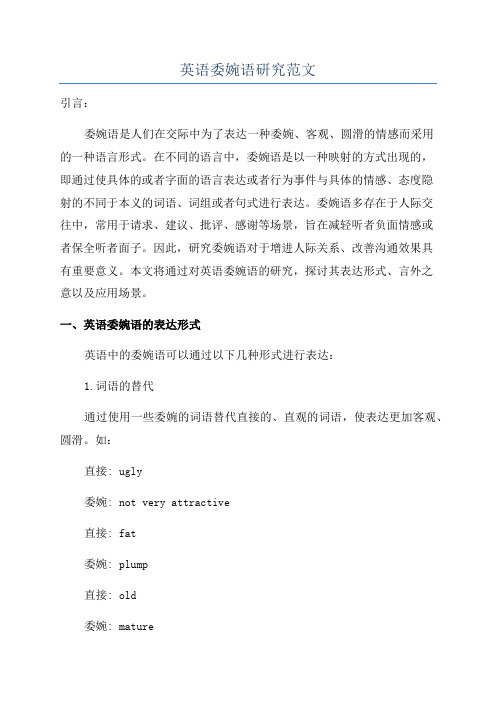
英语委婉语研究范文引言:委婉语是人们在交际中为了表达一种委婉、客观、圆滑的情感而采用的一种语言形式。
在不同的语言中,委婉语是以一种映射的方式出现的,即通过使具体的或者字面的语言表达或者行为事件与具体的情感、态度隐射的不同于本义的词语、词组或者句式进行表达。
委婉语多存在于人际交往中,常用于请求、建议、批评、感谢等场景,旨在减轻听者负面情感或者保全听者面子。
因此,研究委婉语对于增进人际关系、改善沟通效果具有重要意义。
本文将通过对英语委婉语的研究,探讨其表达形式、言外之意以及应用场景。
一、英语委婉语的表达形式英语中的委婉语可以通过以下几种形式进行表达:1.词语的替代通过使用一些委婉的词语替代直接的、直观的词语,使表达更加客观、圆滑。
如:直接: ugly委婉: not very attractive直接: fat委婉: plump直接: old委婉: mature2.句式的转换通过对语法结构进行转换,使表达更加委婉。
如:直接: You must do it now.委婉: It would be better if you could do it now.直接: I don't agree with you.委婉: I tend to differ with you.3.使用修饰语和副词通过使用一些修饰语和副词,可以使表达更加委婉。
如:委婉: You may not be entirely right.直接: You are too slow.委婉: You might want to speed up a little bit.二、英语委婉语的言外之意委婉语的言外之意常常与原意相反,表达出与字面意思不一致的情感和态度。
通过使用委婉语,可以减轻听者的负面情绪,保护他们的面子。
以下是一些常见的英语委婉语及其言外之意:1. Excuse me, but I think there may be a small mistake here.言外之意:You made a big mistake.2. You might want to consider another approach.言外之意:Your idea is terrible.3. I appreciate your effort, but there is room for improvement.言外之意:Your work is not satisfactory.4. It's not exactly what I was expecting.言外之意:I am disappointed with the result.三、英语委婉语的应用场景委婉语在英语交际中被广泛运用于各种场景,以顺利而谦逊地表达情感和态度。
英汉委婉语对比研究论文
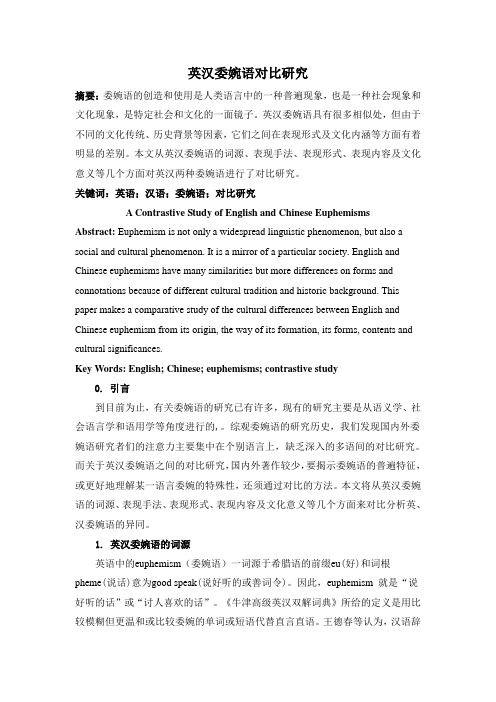
英汉委婉语对比研究摘要:委婉语的创造和使用是人类语言中的一种普遍现象,也是一种社会现象和文化现象,是特定社会和文化的一面镜子。
英汉委婉语具有很多相似处,但由于不同的文化传统、历史背景等因素,它们之间在表现形式及文化内涵等方面有着明显的差别。
本文从英汉委婉语的词源、表现手法、表现形式、表现内容及文化意义等几个方面对英汉两种委婉语进行了对比研究。
关键词:英语;汉语;委婉语;对比研究A Contrastive Study of English and Chinese Euphemisms Abstract: Euphemism is not only a widespread linguistic phenomenon, but also a social and cultural phenomenon. It is a mirror of a particular society. English and Chinese euphemisms have many similarities but more differences on forms and connotations because of different cultural tradition and historic background. This paper makes a comparative study of the cultural differences between English and Chinese euphemism from its origin, the way of its formation, its forms, contents and cultural significances.Key Words: English; Chinese; euphemisms; contrastive study0. 引言到目前为止,有关委婉语的研究已有许多,现有的研究主要是从语义学、社会语言学和语用学等角度进行的,。
英语毕业论文委婉语
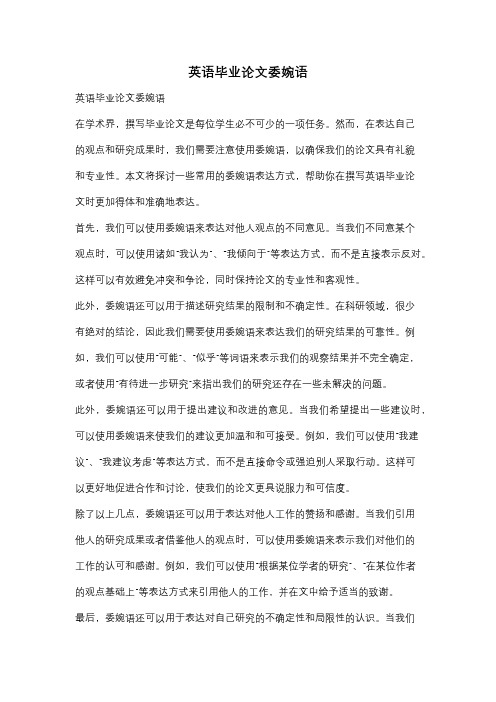
英语毕业论文委婉语英语毕业论文委婉语在学术界,撰写毕业论文是每位学生必不可少的一项任务。
然而,在表达自己的观点和研究成果时,我们需要注意使用委婉语,以确保我们的论文具有礼貌和专业性。
本文将探讨一些常用的委婉语表达方式,帮助你在撰写英语毕业论文时更加得体和准确地表达。
首先,我们可以使用委婉语来表达对他人观点的不同意见。
当我们不同意某个观点时,可以使用诸如“我认为”、“我倾向于”等表达方式,而不是直接表示反对。
这样可以有效避免冲突和争论,同时保持论文的专业性和客观性。
此外,委婉语还可以用于描述研究结果的限制和不确定性。
在科研领域,很少有绝对的结论,因此我们需要使用委婉语来表达我们的研究结果的可靠性。
例如,我们可以使用“可能”、“似乎”等词语来表示我们的观察结果并不完全确定,或者使用“有待进一步研究”来指出我们的研究还存在一些未解决的问题。
此外,委婉语还可以用于提出建议和改进的意见。
当我们希望提出一些建议时,可以使用委婉语来使我们的建议更加温和和可接受。
例如,我们可以使用“我建议”、“我建议考虑”等表达方式,而不是直接命令或强迫别人采取行动。
这样可以更好地促进合作和讨论,使我们的论文更具说服力和可信度。
除了以上几点,委婉语还可以用于表达对他人工作的赞扬和感谢。
当我们引用他人的研究成果或者借鉴他人的观点时,可以使用委婉语来表示我们对他们的工作的认可和感谢。
例如,我们可以使用“根据某位学者的研究”、“在某位作者的观点基础上”等表达方式来引用他人的工作,并在文中给予适当的致谢。
最后,委婉语还可以用于表达对自己研究的不确定性和局限性的认识。
当我们进行研究时,往往会面临一些限制和挑战,我们可以使用委婉语来表达这些困难和不确定性。
例如,我们可以使用“由于时间和资源的限制”、“受到样本大小的限制”等表达方式来指出我们研究的局限性,并提出改进的建议。
总之,委婉语在撰写英语毕业论文时起着重要的作用。
通过使用委婉语,我们可以更好地表达自己的观点和研究成果,避免冲突和争论,同时保持论文的专业性和客观性。
英汉委婉语论文差异性对比论文

英汉委婉语论文差异性对比论文摘要:委婉语作为一种礼貌语言是人类社会共同存在的一种普遍现象,是各种社会因素和心理因素综合作用的结果。
对于建立和保持良好的人际关系,维护社会的和睦、安宁,促进社会文明有着十分重要的作用。
英汉委婉语在功能形式和应用领域方面有着共同的基础,但具体的定义、构成方式和文化内涵是却不尽相同。
在跨文化交际中,了解和掌握中西方文化的差异,有助于我们获得最佳的交际效果。
一、英汉委婉语的共性概述任何语言表达在其功能形式上都有一定的重合,委婉语也不例外。
英汉委婉语的社会功能基本相似。
其使用大都出于以下考虑:一是避免刺激,给人以安慰;二是消除粗俗,给人以文雅;三是摒弃陈腐,给人以新颖(刘纯豹,1996)。
在应用领域方面,尽管中西方在死亡、疾病、性和排泄等方面也存在一些共性的语言禁忌。
二、英汉委婉语的差异(1)英汉委婉语定义的差异性在英语中,最先使用euphemism一词的是西方学者George Blunt,他认为:Euphemism is a good or favorable interpretation of a bad word.后来Flower将委婉语定义为:A mild or vague periphrastic expression as substitute for blunt precision of disagreeable truth.郭秀梅的《实用英语修辞学》认为:Euphemism is the substitution of presumably inoffensive word for onethat might give offense.Euphemism is a soften,bland,neutral expressions used instead of one that might suggest something unpleasant!汉语关于委婉语的定义也很多。
使用委婉语的作文英语
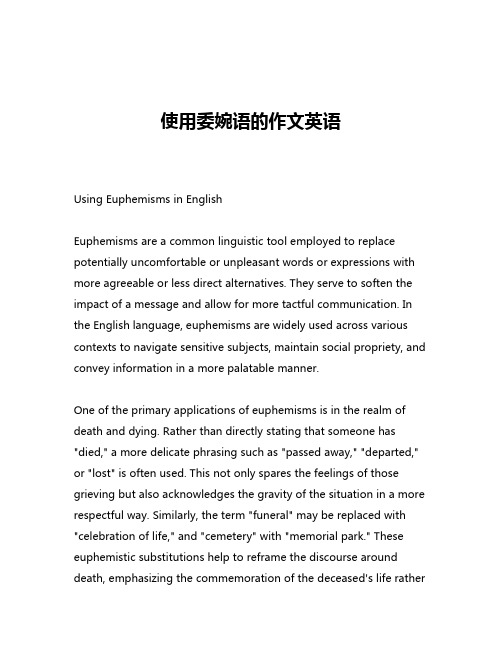
使用委婉语的作文英语Using Euphemisms in EnglishEuphemisms are a common linguistic tool employed to replace potentially uncomfortable or unpleasant words or expressions with more agreeable or less direct alternatives. They serve to soften the impact of a message and allow for more tactful communication. In the English language, euphemisms are widely used across various contexts to navigate sensitive subjects, maintain social propriety, and convey information in a more palatable manner.One of the primary applications of euphemisms is in the realm of death and dying. Rather than directly stating that someone has "died," a more delicate phrasing such as "passed away," "departed," or "lost" is often used. This not only spares the feelings of those grieving but also acknowledges the gravity of the situation in a more respectful way. Similarly, the term "funeral" may be replaced with "celebration of life," and "cemetery" with "memorial park." These euphemistic substitutions help to reframe the discourse around death, emphasizing the commemoration of the deceased's life ratherthan the finality of their passing.Another domain where euphemisms are extensively employed is that of bodily functions and personal hygiene. Terms like "restroom," "lavatory," or "powder room" are used in place of the more direct "bathroom" or "toilet." Expressions such as "going to the littlegirls'/boys' room" or "taking a break" further obscure the true nature of the activity. Euphemisms are also common when discussing menstruation, with phrases like "on the rag," "that time of the month," or "having a visit from Aunt Flo" being used to avoid the direct mention of a biological process.In the realm of interpersonal relationships and sexuality, euphemisms abound. "Making love" is a more delicate way of referring to sexual intercourse, while "intimate relations" or "being intimate" can denote a wide range of physical and emotional intimacy. Euphemisms are also used to discuss pregnancy, with expressions like "with child," "in a family way," or "expecting" being preferred over the more clinical "pregnant." Additionally, terms like "call girl," "escort," or "companion" are used to refer to sex workers, rather than the more blunt "prostitute."The workplace and professional settings also see the frequent use of euphemisms. Employees who have been terminated from their jobs are often said to have been "let go," "released," or "separated fromthe company," rather than being "fired" or "dismissed." Similarly, the term "downsizing" is used to describe the process of reducing the workforce, which has a less harsh connotation than "layoffs" or "redundancies." Euphemisms are also employed when discussing poor job performance, with phrases like "underperforming," "needing improvement," or "not meeting expectations" being preferred over more direct criticisms.In the realm of politics and public discourse, euphemisms are employed to obfuscate or soften the impact of certain actions or policies. For instance, the term "enhanced interrogation techniques" is used as a euphemism for torture, while "collateral damage" refers to the unintended deaths of civilians during military operations. Additionally, the phrase "alternative facts" has been used to euphemistically describe false or misleading information, rather than acknowledging them as lies or misinformation.Euphemisms can also serve to maintain social norms and avoid causing offense. Terms like "differently abled" or "physically challenged" are used in place of "disabled" or "handicapped," and "senior citizen" or "mature adult" replace the more blunt "old person." Similarly, "economically disadvantaged" is preferred over "poor," and "undocumented immigrant" is used instead of "illegal alien."While the use of euphemisms can be seen as a way to navigate sensitive topics with greater tact and diplomacy, it is important to recognize that they can also be used to obscure the truth, downplay the severity of a situation, or perpetuate societal biases. Excessive reliance on euphemisms can sometimes lead to a disconnect between language and reality, potentially hindering open and honest discourse.In conclusion, the use of euphemisms in the English language is a widespread and multifaceted phenomenon. They serve to soften the impact of potentially uncomfortable or unpleasant subjects, maintain social propriety, and convey information in a more palatable manner. However, it is crucial to be mindful of the potential pitfalls of euphemistic language and strive for a balance between sensitivity and transparency in communication.。
- 1、下载文档前请自行甄别文档内容的完整性,平台不提供额外的编辑、内容补充、找答案等附加服务。
- 2、"仅部分预览"的文档,不可在线预览部分如存在完整性等问题,可反馈申请退款(可完整预览的文档不适用该条件!)。
- 3、如文档侵犯您的权益,请联系客服反馈,我们会尽快为您处理(人工客服工作时间:9:00-18:30)。
浅议英语委婉语摘要:在现今社会,随着世界各国之间的交流越来越频繁,委婉语的使用越来越广泛,是用来调剂人际关系的一个重要手段。
通过英语委婉语可以了解英美国家的文化经济背景,值得英语学习者的关注。
关键词:英语委婉语1、引言使用委婉语是世界各个民族语言的一种普遍现象。
委婉语的基本特征就是用一种令人愉快的、委婉有礼的、听起来不刺耳的词语来代替令人不快的、粗鲁无礼的、听起来刺耳的词语。
这种表达方式由来已久,在中国封建时期就有充分的体现。
英语委婉语也是英语文化中不可割舍的一部分,是英语最重要的组成部分之一,也是跨文化交际里一个重要的课题。
2、英语委婉语的定义及起源2.1 英语委婉语的定义英文euphemism(委婉语)一词源自希腊语,词头“eu”的意思是“good”(好),词干“phemism”的意思是“speech”(言语),euphemism 字面上的意思就是“use of pleasant,mild or indi-rect words or phrases in place of more accurate dr direct ones(用好听的话或令人愉快的方式表达)”。
the random house college dictionary把euphemism定义为:the substitution of a mild,indirect,or vague ex-pression for one thought to beoffensive,harsh or blunt,其意就是“用一种令人愉快的,委婉有礼的,听起来顺耳的词语来取代令人不快的、粗鲁无礼的、听起来刺耳的词语”。
美国著名作家门肯(h.l.meneken)称委婉语为gilded words(镀金词),而斯蒂芬·坎费尔(stefan kanfer)把它说成cosmetic words(化妆词),他们无疑都对委婉语的含义和作用做了确切的描述。
美国学者hughrawson曾说:委婉语如此深深潜入我们语言,以至我们中间没有谁一一即使那些自诩为直截了当的人一一能够在不使用委婉语的情况下过完一天。
2.2 英语委婉语的起源委婉语的产生最初与宗教有关,在古希腊和古罗马,由于神的名字被认为是神的化身,提到名字就亵渎神灵。
于是,人们便借助于委婉语来称呼神。
渐渐地随着社会的不断发展,委婉语开始应用于其他领域。
在16世纪年80年代初.作家乔治·布朗特首先使用“euphemism”一词。
到18、19世纪,委婉语在英国及其他国家迅速发展起来。
20世纪80年代,美国委婉语在金钱、疾病、政治和战争等话题中用得最多。
3、英语委婉语的特点3.1 时代性时代在变化,语言也发生着变化,新词不断出现,旧词逐渐消失,委婉语更是如此。
而各个时期的社会问题影响着人们的心理状态,这在委婉语中也清楚地反映出来。
例如,随着美国黑人人权运动的发展,在美国对“黑人”的称呼一直从“negro”到“blaekpeople”,再到现在的“africanameirean”,足以表明其时代的烙印。
3.2 普遍性委婉语虽然不是开门见山,直抒胸臆,但熟悉英语的人很容易就听出言下之意,像禁忌语的众多委婉说法就被大众接受。
3.3 语域性在不同的语境中,或在同一语境中,不同年龄、身份、地位或受教育程度不同的人委婉表达也不尽相同。
例如,上厕所,女士可能说to powder one’s nose,tofreshen up;男士则可能说to go tothe toilet,或nature is urgent;而小孩则可能说make number one,gotothepot.3.4 含蓄性这是委婉语的最大特点。
例如下面的一个句子:in a fewmin-utes the“madam”.as the current word characterized this type of women,appeared…(不一会儿,“夫人”,当今对这类女人的时尚称呼语,出现了…)“madam”通常以称呼已婚女士的礼貌用语,但这儿用来却指的是妓院的“鸨母”。
3.5 习语化很多委婉语经人们长期使用,成为固定表达,已经习语化,并且进入了英语词汇。
有些同一意思内容先后由不同的委婉语替代,如mad(疯的)先后有crazy,insane,lunatic等替代过。
4、英语委婉语的功能我们日常的交流是绝对离不开语言的,而中国也有句俗语叫做“良言一句三冬暖,恶语伤人三月寒。
”由此可见,委婉语的使用在减少误会、消除摩擦等方面有着不可替代的作用。
4.1 避讳功能忌讳是委婉语产生的主要心理基础。
比如人们害怕说“穷老病死”等词语,相关的委婉语也就应用而生。
如:用“to be with cod”“co to sleep foerver”代替“death”;用“the big c”或“socialdisease”代替广为流行且令人胆战心惊的“aids”(艾滋病)。
4.2 讽刺功能委婉语同时具有讽刺性的功能。
就拿college(学院)这个词来说,许多人都知道其字面意思,但囚犯们用它来称呼“监狱”却极少人知晓。
囚犯们为了自我美化,自我洗刷,把因犯罪而被迫关进监狱强行学习改造视为在大学为增加知识而学习,体现了他们的强烈虚荣心,此词因此也颇具讽刺意义。
4.3 幽默功能在丰富的英语委婉语中,不乏幽默的表达方式。
这类幽默委婉的表达方式可以使人们的语言妙趣横生,诙谐风趣。
在本世纪以来,英国人在吃饱以后谢绝主人的殷勤劝食时常这么说:“i’mwilling,but mary isn’t”。
(我倒乐意,但肚子不行了。
)这里把“胃”人格化为“mary”.不仅运用辞格(托物拟人)的手法,而且别致幽默。
4.4 掩饰功能委婉语的语用常常是出于好的动机,使对方感到你的友好。
但由于委婉语替代的是另一种意思.社会各阶层将其双层含义或模糊含义广泛运用,有利于他们说谎,形成不诚实的委婉语。
例如:本世纪初劳资关系紧张,罢工风潮成为严重的社会问题,报界为了掩盖矛盾真相,把“劳资关系”含糊的成为industrial relatio.“劳资争端”成为industrial dispute。
这些模糊词语的使用,掩盖了事物的真实性。
5、英语委婉语的使用范围委婉语的使用范围是极其广泛的,可以粗略分为四大方面。
5.1 日常生活中的委婉语人体的生理缺陷、年老、人体的某些功能,性行为等方面的词汇常用委婉语。
如一个人太胖用big,beavy weight来代替fal。
对于一个身体清瘦的妇女用slender或slim等来代替thin,相貌不雅则用plain,ordinary,homely等。
人们不用“老人”(old people)而用老年人(adult)、资深公民(senior citizen)、保养得很好的人(well-pre-servedman)等;将养老院说成rest home(休养院)、homefor adult(成人之家)等等。
无论在何种文化中,死(death)这个词是人们最忌讳的。
英语中有许多相应的委婉表达语,多达上百条,如:go west(去西方),be at rest(安息),be asleep inthe arms of god(安睡在上帝的怀抱中),breathe oriels last(作最后一次呼吸),pass away(离去),go to heaven(上天堂)等。
与性或性器官有关的词也属于此类范畴,如fuck,have sexualintercourse常用go to bed.sleep together,have relation 等表述。
还有一些人体功能方面的委婉语,如用wash one’s hands(洗洗手),relieve oneself(让自己轻松一下),auswerthe call of nature(应付自然本能之需)等来做为表达“大小便”的委婉语。
5.2 社会生活中的委婉语用to be down on one’sluck(时运不佳的)。
deprived(被剥夺了生活条件的),low income(收入低的)来代替穷人。
失业的人说成是forgotten man,用ease out表达解雇。
英语中还有很多职业委婉语。
使用职业委婉语的主要目的是为了将传统意义的“低下职业”体面化。
如:将餐厅中的waiter或waitress(服务员)称为dining-room attendants(餐厅管理员);将landscape worker(园林工人)类比成landscape architect(园林建筑师),sanitary cusiucer则是garbage collector(清洁工)的委婉说法。
5.3 教育中的委婉语委婉语也同样出现在教育中,尤其是对学生的评价则需要考虑措辞,用积极词汇代替消极词汇。
如成绩差的学生是a belowaverage student或working on his owrl level;depend on others to do hiswork=cheatin class指作弊;说can do better work withhelp(有别人帮助可以学得更好些)比直接说学生slow(迟钝)或stupid(笨)更好些;5.4 在政治、经济和军事战争中的委婉语20世纪20、30年代。
美国经历了前所未有的经济危机.政客们将economic crisis委婉说成depression(萧条),slow down(减速,指“经济衰退”),cash flow problem(现金流动问题,指可用现金不足)。
英美人常把反政府的人叫做dissident(持不同政见者);把罢工说成walk-out,down tools,而不说strike。
海湾战争时以出现了air operation(空中手术)和ground operation(地面手术)这类表示空中轰炸和地面战争的代用词。
6、结语委婉语的形成已久,它不仅仅是语言现象,同时可以用来调剂人际关系。
随着社会的发展,人们在日常交流中,使用的语言更偏向于间接委婉。
由于英语委婉语在英语中广泛应用。
所以英语学习者了解一些委婉语对于了解英语国家的文化经济,提高英语水平非常有帮助。
参考文献:[1]刘纯豹.英语委婉语词典[m].北京:商务印书馆,2001[2]张杏珍,浅论英语委婉语的交际功能.中共南京市委党校南京市行政学院学报,2004[3]陈科芳.从英语委婉语比较谈委婉语的翻译[c].外语与文化研究.上海:上海外语教育出版社,2004[4]张竞碧政治活动中的英语委婉语.湖北工学院学报,2003,(18)[5]张秀梅.浅谈英语委婉语.成都教育学院学报,2005,(19)。
